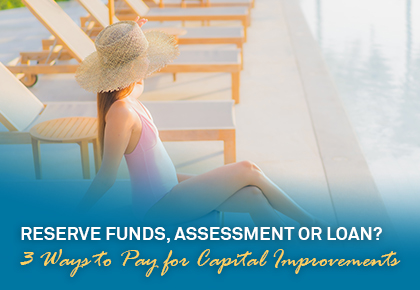-
A capital improvement plan for your Georgia association
A successful capital improvement project requires a lot of planning to ensure that things go as smoothly as possible. Does your community know where to start? -
Managing Your Association’s Paperwork: 6 Tips to Make it Easier
You're not alone if organizing paperwork is not one of your favorite things to do? Follow these 6 tips to streamline your operations and increase efficiency. -
Nine Essential Facts About Conflicts of Interest
Conflict of interest can be a real threat to your association. Learning how to recognize and avoid conflicts of interest can go a long way toward ensuring the strength and stability of your community. -
5 Steps to the Best Reserve Study Firm
Nothing lasts forever and you need to have a plan to replace major items and systems before their lifespans end. How do you create that plan? Start with a quality reserve study. -
The Risks and Rewards of Self-Managed Community Associations
Are you doing all you can to make sure your self-managed community meets its goals? -
Understanding the Fair Housing Act: Homeowners Association
All associations are subject to the federal Fair Housing Act (FHA) and its antidiscrimination provisions. Stay informed to identify the ways you could be exposed to claims of discrimination. -
Slow and Steady: 5 Surprising Benefits of Raising Your Dues
It’s that time of year again – budget season is upon us. You know the things to consider when creating your budget, but what drives your process? Are you focused on achieving a particular vision for your community? Avoiding conflict in the community? Solely looking to avoid increasing dues? -
Is Your Management Company a Good Communicator?
Is good communication important to your property management company? Use this questionaire to find out. -
To Self-Manage or Not? How to Get the Best Property Management Service.
Some self-managed associations believe they can't afford to hire a professional property management company to manage and maintain their community's operations, assets, finances, common areas and other day-to-day activities. However, as you'll learn in this article, a professional property management company is one thing many communities can't afford to be without. -
What does the board secretary really do?
The Board Secretary is responsible for meeting the Association’s legal and financial obligations and maintaining the Association’s records. Depending on the Association’s requirements, some of the following tasks may need to be distributed to other Board Members or it might be necessary to appoint an assistant to the Secretary. -
Repairs and Maintenance vs Capital Expenditure: What's the Difference?
It’s no secret that association management is a big job. Across Minnesota, common areas require a lot of routine maintenance to uphold community standards – things like exterior light bulb replacements, landscaping and paint touch-ups. Depending on your townhome community, the scale of your amenities' needs will vary. -
Before Creating a New HOA Policy, Ask These 5 Questions
Great policies can help your association run smoothly, enhance the resident experience and improve your reputation. Here are five questions to ask before creating a new HOA policy. -
Don’t Be the HOA Bad Guy: 4 Proven Policy Enforcement Tips
Enforcing HOA policies is nobody’s cup of tea, but having good policy enforcement in place helps improve the resident experience and elevates your reputation. Follow these 4 principles for healthy policy enforcement: -
HOA Committees and Volunteers: 8 Tips to Rally Residents
An effective Nevada homeowners association will not only recruit great volunteers and committee members, but will empower them to help improve the community. The question is – how do you get there? -
HOA Reserve Funds: 6 Tips to Improve Your Returns
Are you really getting the best returns on your reserve funds? Most Nevada board members aren’t sure. Learn six ways to improve your reserve fund returns. -

How to fund HOA capital improvements
Great capital improvements improve property values. Read on to see the three ways to pay for them and the pros and cons. -
6 Questions for Self-Managed Associations to Consider
As a self-managed association, do you need a management partner? Before making that choice, ask these 6 questions. -
How Does Your Community Rate?
Do you know how your community rates to newer communities? What can you do to change your image? Find out how you can be keep your rating up in this new article by Erin O'Reilly that was featured in Management Trends. -
Habitat Magazine-Here Are Ways to Pay for Retrofits to Reduce Carbon Emissions
The Climate Mobilization Act, requires buildings 25,000 square feet and larger to reduce greenhouse gas emissions by certain target percentages in 2024, 2030, and beyond. -
Steps for Condo or Co-Op Hoarding Clean Up, NYC
Hoarding can be dangerous to every resident in your NYC condo or co-op building. Learn how to work with hoarders in your building today. -
The Ins & Outs of NYC Building Energy Rating and Energy Grades
FirstService Residential and FirstService Energy are prepared to help boards and owners identify capital improvements or retrofits that improve a building's energy efficiency score and letter grade. -
The Six Secrets to Building Your Condo’s Volunteer Pool
As a board member for your condominium corporation, you know that your community depends on volunteers to operate successfully. However, finding residents who are willing to be on your board of directors, join a committee or help at an event can be challenging. -
-
Ask the Expert: Homeowners and Condo Owners Association Reserve Study
View our third episode of Ask the Expert, featuring Andrew Stoutenburg, Regional Executive Director of Reserve Advisors, as he talks about the importance of reserve studies in financial planning.